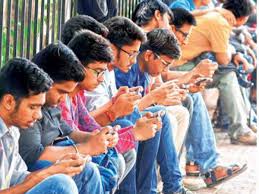Today the dependence on the mobile is so complete that without it many people feel lost and disoriented. Besides keeping you in touch, your phone also tells time, gives the weather forecast, keeps note of appointments, provides all kinds of encyclopedic information. It shares pictures, creates chat groups, stores your music videos, even structures your daily medical, banking and nutrition record. Short of heating your club sandwich, your mobile is your closest friend. Is it any wonder then that ..
![]()
 In the US, phone addiction is now being equated with forms of drug and narcotics abuse. Psychologists even treat patients for symptoms of compulsive behaviour disorder related to their phone habits. Rehab centres have opened up in major cities that provide out-patient therapy; in advanced cases of addiction, patients check into clinics that slowly increase the duration of phone deprivation; these are often accompanied with a relapse prevention program. Today new apps are being designed explicitly for the purpose of escaping from the phone — to disconnect us digitally so we may connect physically.
In the US, phone addiction is now being equated with forms of drug and narcotics abuse. Psychologists even treat patients for symptoms of compulsive behaviour disorder related to their phone habits. Rehab centres have opened up in major cities that provide out-patient therapy; in advanced cases of addiction, patients check into clinics that slowly increase the duration of phone deprivation; these are often accompanied with a relapse prevention program. Today new apps are being designed explicitly for the purpose of escaping from the phone — to disconnect us digitally so we may connect physically.
However, in a country that is still trying to extend mobile use to its poorer population, such addictions seem like a strange futuristic hallucination. How can you be an addict to useful information, net banking, crop agricultural practices, and the like? Yet misuse of phone and digital technology is visible anywhere: the student on the phone oblivious to street traffic; the Uber driveRr watching a dance video as he drives; the executive vacationing in Ladakh but still connected to his Delhi office routine. It is estimated that the middle-class working Indian spends an average of 5-6 hours each day on the phone or computer, of which more than half the time is on the mobile, checking for information, emails and amusements. This leaves little time for family, friends, home routines, shopping, or just looking out of the window at the monsoon rain.
Buying App: If you buy a book on Amazon, it will produce 20 other titles of similar content. Every choice you make directs you to a future of similar choices. Your likes make you likeable to reading matter you have al ..









